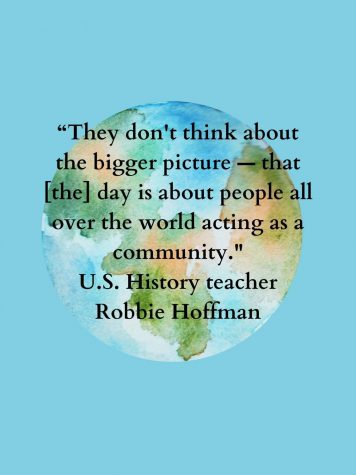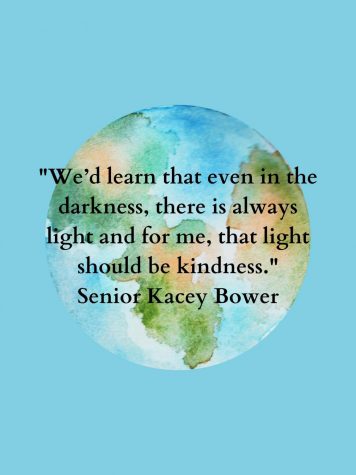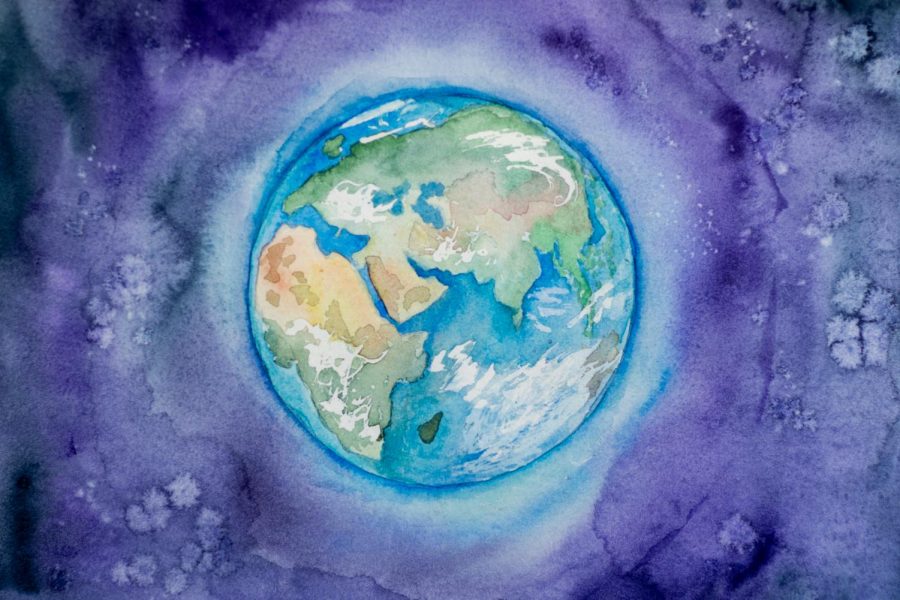Beyond World Kindness Day
Staff and students reflect on the impact of kindness as a lifestyle rather than an annual celebration
November 13, 2021
World Kindness Day, which falls on Nov. 13, presents a single day in the year where people actively celebrate kindness by thinking of creative ways to help and care for others. Junior Kacey Bower, however, doesn’t see the day as simply an opportunity to be kind. Instead, she believes the day as an excuse for individuals to be kind for only 24 hours and then forget the idea of kindness for the rest of the year.
“The biggest way I show kindness is through being extroverted and trying to say ‘Hi’ to people I might not know, but that is also part of my personality naturally,” Bower said. “I’m just extending it to others through my smiles. The point [is that] I’m taking a part of my personality and opening up and connecting with others, which, in my opinion, is what kindness is all about. So it doesn’t have [to be a] celebration when that should really be a part of who we are when we’re around others.”
Likewise, U.S. History teacher Robbie Hoffman believes that while celebrating World Kindness Day, people often misunderstand the message of being kind and rather than focusing on the celebration, they should focus on how kindness is integrated into their everyday life.

“I think [the day] is just a reminder [to be] kind,” Hoffman said. “I think sometimes people get wrapped up in themselves as they give gifts and feel good about their actions and they don’t think about the bigger picture — that [the] day is about people all over the world acting as a community.”
Hoffman believes that people should focus less on what he believes to be “common formalities,” such as holding doors open for people or giving gifts, and more on connecting to people more intimately.
“This might be a cliche, but it really is all about treating others as you would want to be treated,” Hoffman said. “Kindness is really a recognition [of who people are] and acknowledging them as an individual through your actions. It’s doing something small for somebody; it doesn’t [have] to be large. I think that if you do a lot of small things, and you do it consistently, it’s better than doing one big thing because that goes beyond just one annual day but anytime [someone] seems like they need that helping hand.”
Senior Emily Yu also believes that kindness is especially valuable in the current climate as people recover from a year of isolation and quarantine. If behaving with kindness with one another was an expectation, Yu believes that people could connect through more meaningful thoughts and feelings.
“What makes kindness work is that it is passed on from person to person, day to day without anyone needing to be told,” Yu said. “It is not hard to get out of your comfort zone and say hello to someone or smile and it’s something that we should normalize now more than ever since the pandemic has left us lonely and without enough real interactions.”
Bower believes a positive side effect of more meaningful interactions is fostering more empathy and gaining the ability to “sense when someone isn’t feeling great” in order to “help them with whatever they’re going through.” Hoffman explains that this empathy and acts of kindness must not be accompanied by an expectation that someone should return the gesture.
“Kindness isn’t a debt,” Hoffman said. “So I wouldn’t expect anything back from people because it’s just something that should be just universal. It’s like giving a gift. If we could live by this kind of thinking, I just think it would make the world a better place. And if you grow up that way, and you’re raised that way, then we don’t need a day to tell us when to be kind because it would be a part of our lifestyle.”
Yu believes kindness could have a big impact on the future in which people can become closer to each other through kind and mindful interactions.

“A lot of the time even the friends closest to you could possibly be going through what may be their toughest time, but they could be struggling to open up about it,” Yu said. “It’s moments like these where even a little bit of kindness can inspire the confidence to trust each other more and that allows our relationships to become stronger.”
Bower also believes that if people can make being kind a regular occurrence then society as a whole can grow from it.
“If we all just took the initiative to be kind every day [of our] lives I think we’d appreciate everyone more,” Bower said. “As a society we always ignore each other and let those around us get hurt because we aren’t valuing being kind. But if we did, we wouldn’t be afraid to ask each other for help and support because we’d know that the reactions from others would always be positive and out of good intentions. We’d learn that even in the darkness, there is always light and for me, that light should be kindness.”

















